
Bristol is a city and county in South West England with a population of 459,300. The wider district has the 10th-largest population in England. The urban area population of 724,000 is the 8th-largest in the UK. The city borders North Somerset and South Gloucestershire, with the cities of Bath and Gloucester to the south-east and north-east, respectively. South Wales lies across the Severn estuary.
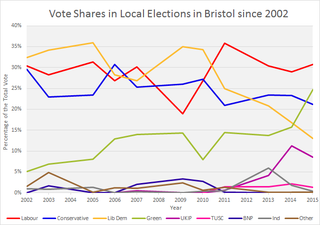
Bristol is a unitary authority and ceremonial county in England. Until 1 April 1996 it was a non-metropolitan district in Avon. Since 2012 it has also had a directly elected mayor.

Bristol City Council is the local authority of Bristol, England. The council is a unitary authority, and is unusual in the United Kingdom in that its executive function is controlled by a directly elected mayor of Bristol. Bristol has 35 wards, electing a total of 70 councillors.

The city of Bristol, England, is a unitary authority, represented by four MPs representing seats wholly within the city boundaries. As well as these, Filton and Bradley Stoke covers the northern urban fringe in South Gloucestershire and the north eastern urban fringe is in the Kingswood constituency. The overall trend of both local and national representation became left of centre, favouring the Labour Party and Liberal Democrats during the latter 20th century, but there was a shift to the right in the 2010 general election. The city has a tradition of local activism, with environmental issues and sustainable transport being prominent issues in the city.

The 1986 Bristol City Council election took place on 8 May 1986 to elect members of Bristol City Council in England. This was on the same day as other local elections. One third of seats in the 1986 Council Elections in the English city of Bristol were up for election. The election in Brislington West was a by-election. There was a small swing away from the Conservatives and Labour regained a majority on the Council, which they kept until 2003.

The 1987 Bristol City Council election took place on 7 May 1987 to elect members of Bristol City Council in England. This was on the same day as other local elections. One third of seats were up for election. There was also a by-election in Clifton. There was a general but very small swing away from the Conservatives.

The 1992 Bristol City Council election took place on 7 May 1992 to elect members of Bristol City Council in England. This was on the same day as other local elections. One third of seats were up for election. Two seats were contested in Hartcliffe due to an extra vacancy occurring. The elections were held just weeks after John Major's unexpected 1992 General election victory, and mirroring that result there was a strong swing from Labour to Conservative.
Bristol City Council is a unitary authority and ceremonial county in England. Originally formed on 1 April 1974 as a non-metropolitan district as a result of the Local Government Act 1972. It was envisaged that Bristol would share power with Avon County Council, an arrangement that lasted until 1996 when it was made into a unitary authority by the Local Government Commission for England, which abolished the county of Avon and gave Bristol City Council control of Avon Council's responsibilities.
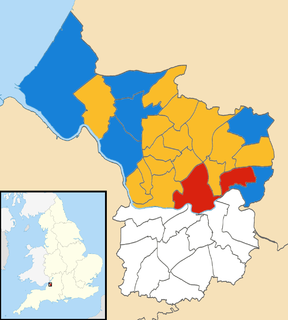
The 2009 Bristol City Council elections were held on Thursday 4 June 2009, for 23 seats, that being one-third of the total number of councilors. The Liberal Democrats who had been leading a minority administration, won an overall majority of the council, the first time the party had achieved this on Bristol City Council. The Liberal Democrats were defending 11 seats, the Labour Party 10 and the Conservatives 2.
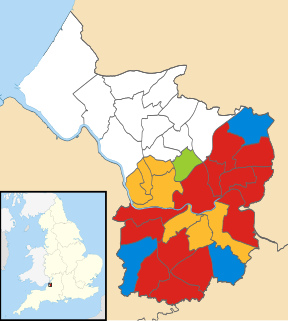
The 2011 Bristol City Council elections were held on Thursday 5 May 2011, for 24 seats, that being one third of the total number of councillors. The Liberal Democrats, who had won overall control of the council in 2009 and increased their majority in 2010, experienced a drop in support and lost 5 seats; 4 to the Labour Party and 1 to the Green Party, which gained its second ever council seat in Bristol. This meant that the Lib Dems no longer had a majority on the council. However, they continued to run the council, relying on opposition groups to vote through any proposal.
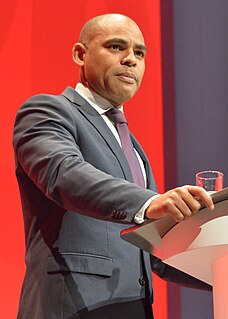
The Mayor of Bristol is the head of Bristol City Council. The Mayor is an elected politician who, along with the 70 members of Bristol City Council, is responsible for the strategic government of the city of Bristol, England. The role was created after a local referendum held on 3 May 2012, which followed the passage of the Localism Act 2011. 41,032 voted for an elected mayor and 35,880 voted against, with a turnout of 24%. An election for the new post was held on 15 November 2012.

The 2014 Bristol City Council election took place on 22 May 2014 to elect members of Bristol City Council in England, as part of the United Kingdom 2014 Local Elections.

Elections to the Bristol City Council were held on 7 May 1998 as part of the 1998 United Kingdom local elections. 22 wards were contested.
The 2015 Bristol City Council election took place on 7 May 2015 to elect members of Bristol City Council in England. This was on the same day as other local elections.
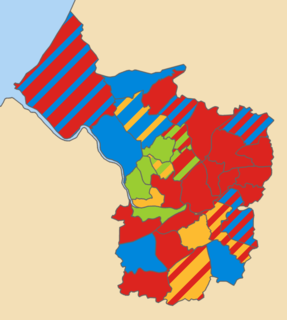
The 2016 Bristol City Council election took place on Thursday 5 May 2016, alongside nationwide local elections. Following a boundary review, the number of wards in the City was reduced to 34, with each electing one, two or three Councillors. The overall number of Councillors remained 70, with all seats are up for election at the same time. Elections would then be held every 4 years.

The 1973 Bristol City Council election took place on 7 June 1973 to elect members of Bristol City Council in England. This was on the same day as other local elections. Voting took place across 28 wards, each electing 3 Councillors. Following the Local Government Act 1972, this was the first election to the new non-metropolitan district council for Bristol, which came into being on 1 April the following year. Labour took control of the Council after winning a comfortable majority of seats.

The 1999 Bristol City Council election took place on 6 May 1999, on the same day as other local elections. All seats were up for election due to boundary changes, with each ward electing 2 councillors. The total number of seats on the council increased by 2 due to the creation of a new ward: Clifton East.

The 2002 Bristol City Council election took place on 2 May 2002, on the same day as other local elections. Despite suffering some losses, the Labour Party managed to retain a slim majority.
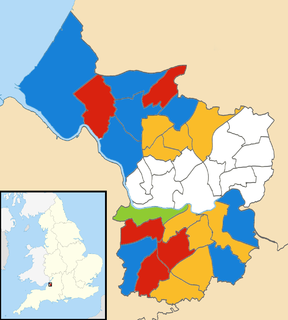
The 2006 Bristol City Council election took place on 4 May 2006, on the same day as other local elections. The Labour Party continued to lose seats, but the Liberal Democrats failed to gain enough to form an overall majority. This election saw the first election of a Green Councillor to Bristol City Council – the first time four parties had been represented since the Council’s creation.

The 2007 Bristol City Council election took place on 3 May 2007, on the same day as other local elections. The Liberal Democrats lost 2 seats to Labour, but remained the largest party on the Council. No party gained overall control.


















